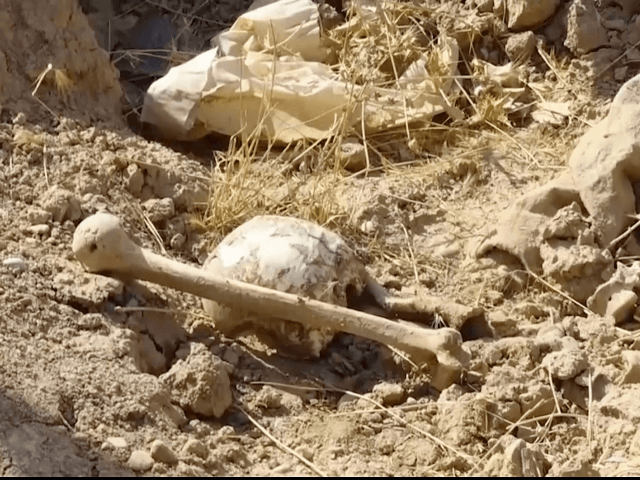The Iraqi Armed Forces said on Tuesday they had unearthed a mass grave of 50 people “executed” by the Islamic State (ISIS) terror group in northern Iraq’s Kirkuk province.
“The technical division of the Federal Police discovered a mass grave in a village in Kirkuk during a security search raid,” Brigadier General Yahya Rasool, an Iraqi Armed Forces spokesman, announced in a Twitter statement on Tuesday night.
The mass grave “contained the bodies of 50 people who were executed by Daesh [ISIS] terrorists during their control over the region,” Rasool added. The Iraqi military has yet to provide more details on the bodies’ identities.
Kirkuk province is disputed between Erbil – the capital of Iraqi Kurdistan, an autonomous region ruled by the Kurdistan Regional Government (KRG) – and Baghdad, Iraq’s national capital. ISIS invaded Kirkuk in 2014, capturing wide swathes of territory. Kirkuk’s capital, also named Kirkuk, was traditionally administered by the national government in Baghdad prior to the ISIS invasion. After the terror group attacked the province, the Iraqi military fled and the Kurdish Peshmerga, a U.S. ally, stepped in to protect the city, placing it under the control of the KRG.
“Baghdad, backed by pro-Iran Shiite militias known as the Popular Mobilization Units (PMU/PMF),” at the time “expelled the Peshmerga in late 2017 following the KRG’s decision to hold a non-binding referendum on independence,” Breitbart News reported.
After forcing the Peshmerga out of Kirkuk, “it took Iraqi forces three years to fully recapture the territory from the clutches of the group [ISIS], which held areas including Hawija, Riaz and Rashad towns and a myriad more villages in the southern part of the province,” Kurdish news agency Rudaw recalled.
The United Nations Assistance Mission for Iraq (UNAMI) and the U.N. Human Rights Office said in November 2018 that they had documented over 200 mass graves across territories previously occupied by ISIS in Iraq.
“[T]he 202 mass grave sites were found in governorates of Nineveh, Kirkuk, Salahuddin and Anbar in the north and western parts of the country – but there may be many more,” according to the U.N. report.
At the time, the U.N. said it estimated that between 6,000 and 12,000 bodies were buried across the 202 mass graves. The graves’ victims included “women, children, elderly and persons with disabilities, foreign workers, and members and former members of the Iraqi armed forces and police.”
According to the U.N., “It is critical that the integrity of the mass grave sites be maintained as they potentially contain significant sources of evidence which can be used for criminal prosecutions.” This means that the excavation process for such graves may be painstakingly slow.
U.N. teams began exhuming mass graves near the city of Kocho in northern Iraq in April 2019, five years after ISIS massacred hundreds of Yazidis there in August 2014 for refusing to convert to Islam.
“Only 26 bodies have been exhumed so far,” Agence France-Presse (AFP) reported at the time.
“There were a number of issues, including the security situation in this area,” Dhia Kareeman, who works with the Iraqi Council of Ministers’ Martyr’s Foundation, told AFP.

COMMENTS
Please let us know if you're having issues with commenting.